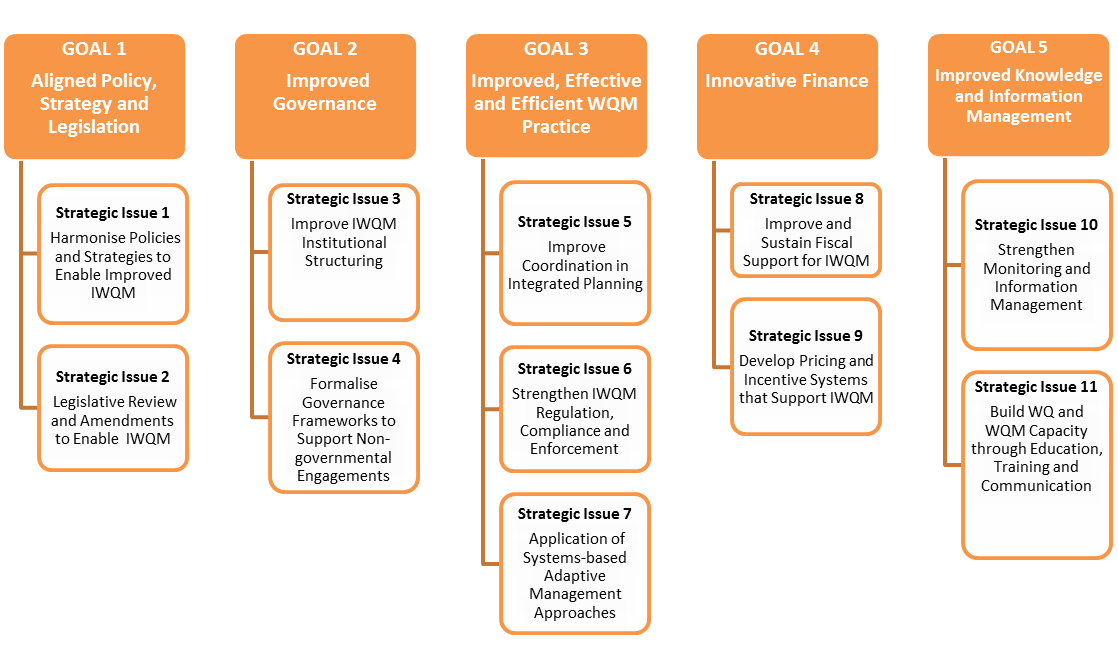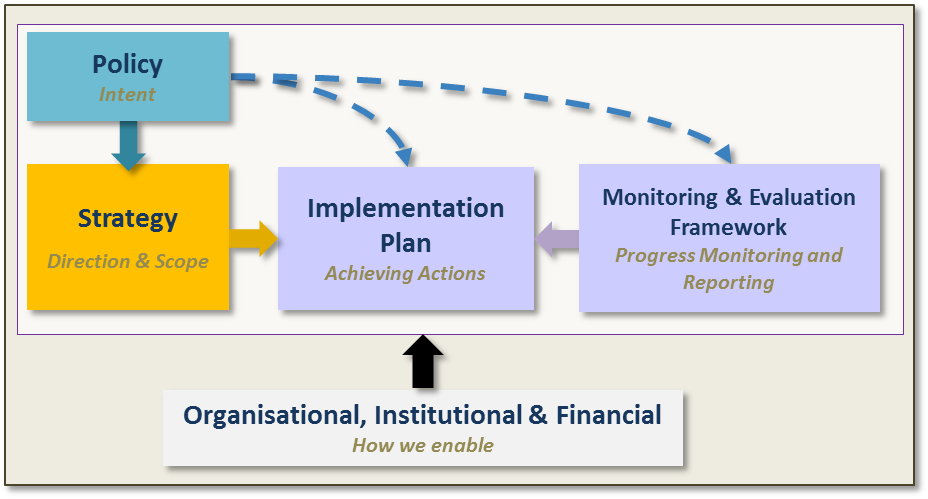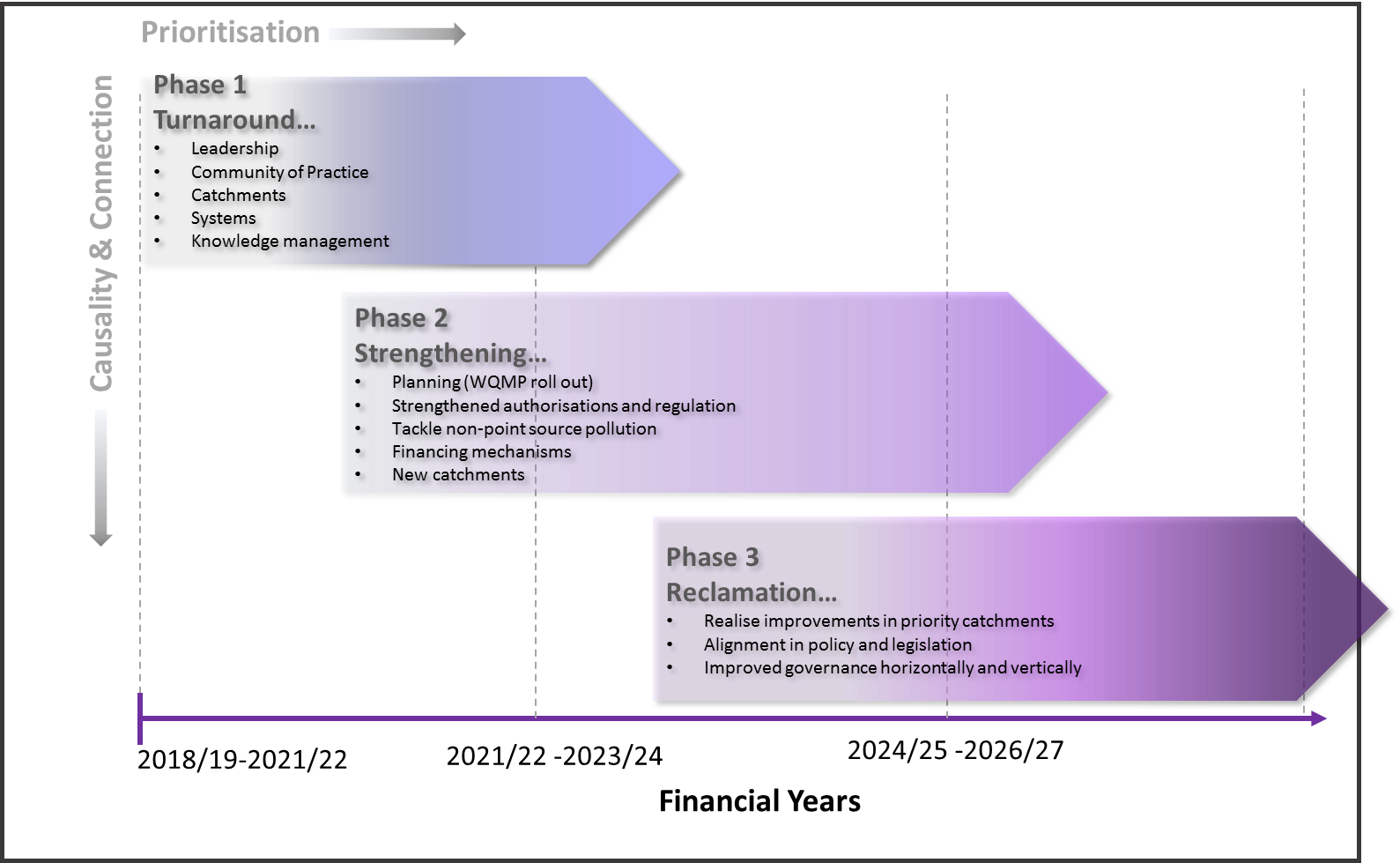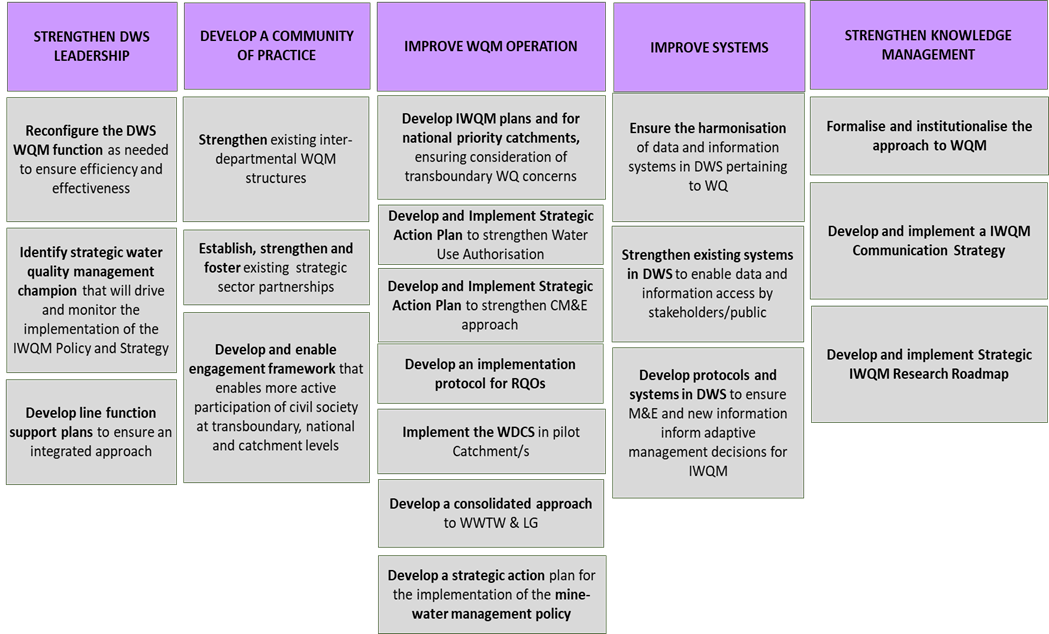PROJECT OVERVIEW
In response to the country's need to better address its water quality challenges and take an improved integrated approach to Water Quality Management (WQM), in later 2015, the Department of Water and Sanitation initiated a project to revise its current WQM Policies and Strategies. This included the 1991 WQM Policy and Strategy and the 2006 Resource Directed Management of Water Quality Policy and Strategy, amongst others.
The goal of the project was to-
develop a IWQM Policy and Strategy which provides the necessary guidance to Government, as well as the larger water sector, for the effective, sustainable and integrated management of South Africa’s surface and ground water quality.
There were three main outcomes of the project namely an IWQM Policy, an IWQM Strategy and the establishment of various implementation measures aimed at converting policy into practice. It should be noted that the integration of the WQM Policy and IWQM Strategy with wider national policies provided the opportunity to align the approaches toward managing water quality with other activities the Department, and in Government as a whole. This helped entrench this project and secure its sustainability going forward.
To achieve the above goal, the project was divided into 5 phases:
Inception Phase: This kick-off phase of the project undertook a review of the Terms of Reference against the current needs and requirements, in order to describe the approach used, the scope of the work that would be undertaken and the project programme. This provided an opportunity for the project team (the consultant team and the DWS team) to align their understanding of the key project processes and outcomes.
Assessment Phase: In the assessment phase the current as well as emerging resource water quality, Water Quality Management and integration problems and challenges were identified. Water Sanitation issues as relevant to the project scope were also taken into consideration. The assessment phase undertook an analysis of existing information to develop a national perspective that would adequately inform the policy and strategy. This phase consisted of the development of a WQM Glossary of terms, an assessment of the current and potential future Water Quality and Water Quality Management challenges in SA and a literature Survey. The literature survey consisted of:
-
a survey of the current WQM policies and strategies in SA and the International examples of WQM that SA could learn lessons from,
-
a Survey on the WQM instruments that exist in SA (guidelines and tools), and
-
a Survey of the current institutional arrangements for WQM in SA.
Policy Formulation Phase. Based upon the situation assessment this phase of work developed the IWQM Policy. Noting that the policy should be both practicable and progressive, the process to develop the new policy involved engagement with stakeholders inside DWS as well as other government departments, the private sector and civil society. As a result, the development of the policy was able to formalize the Government and larger water sectors intentions with regards to Water Quality Management in South Africa. The IWQM Policy will be gazetted for public comment before being finalised.
Strategy Development Phase: Importantly, policy is not of any real value unless it can be implemented. As a result, the project undertook the development of an IWQM Strategy that would provide the implementation pathways that would give effect to the Policy. The strategy therefore looked at the current root causes of the water quality issues the Country is experiencing and provided clear direction in terms of the actions required to improve and integrate our approaches towards Integrated Water Quality Management. The strategy lists all those actions which would be required to improve the management of water quality in South Africa up to 2030 and beyond. The prioritisation of these activities for implementation over the next few years was undertaken as part of the next phase of the project.
In responding to the IWQM Vision, that “Government, in partnership with private sector and civil society, secures water that is fit-for-use, for all, forever!”, the IWQM Strategy is based upon five Strategic Goals:
-
Goal 1: Aligned Policy, Legislation and Strategy: In order to support our drive to be more inclusive in our approach there will be a need to find ways to improve the alignment between policy and legislative instruments, as well as in our strategic approaches. This will take time and considerable effort, but will prove critical.
-
Goal 2: Good Governance: An inclusive approach will require that we find ways to improve functional roles and responsibilities. This will require innovative approaches to the way we structure our approaches both within Government and externally with non-Governmental actors.
-
Goal 3: Efficient and Effective WQM Practice: The need to be more adaptive in our responses to WQM will require increasingly efficient and effective practices within catchments. This will mean critical review of these processes and practices at various levels within the WQM system.
-
Goal 4: Innovative Finance: To date there has been too much dependence upon funds from the national fiscus to support WQM. Noting that financial resources are limited, there will be a need to be more innovative in generating the funds required to support more effective IWQM.
-
Goal 5: Effective Knowledge and Information Management: The old adage that you cannot manage what you do not measure holds true. This requires a renewed and strengthened drive to improve than monitoring networks and to strengthen and consolidate information management systems. Our adaptive management approach is based upon the support of these networks and systems.
Strategic planning requires that we develop a broad coherent medium-term set of priorities, objectives, strategic actions (typically for five to ten years), that contribute towards achieving the vision under varying conditions and available capacity. To be implemented, the strategy is translated into specific measurable strategic objectives and actions that are achievable with the available resources in a given time frame.
Whilst it is important to have a Policy that guides our thinking and intent with regards to IWQM, the rubber hits the road through the development and implementation of an IWQM Strategy.
To this end, the IWQM Strategy is a national strategy that reflects:
-
The urgency to change the approach to WQM;
-
The need to ensure that the trajectory of declining water resource quality is reversed, and
-
The necessity to create the right capacity to strengthen our management of water resources whilst we progressively work towards a longer-term vision of practical and adaptive IWQM.
The five strategic goals are given effect to through eleven strategic issues. The IWQM strategy provides a number of strategic objectives and strategic actions under each issue.

| Strategic Issue |
Relevance |
|
Strategic Priority 1
Harmonise Policies and Strategies to enable improved WQM
|
Present a consolidated sectoral approach to WQM, with the support from private sector and civil society
|
Strategic Priority 2
Legislative review and amendments to enable integrated WQM |
Support the implementation of this strategy by putting in place legislative mandates to apply the administrative penalties approach, and other supporting legislation |
Strategic Priority 3
Adapt and integrate WQM institutional structuring |
Achieve institutional alignment in all spheres of government, private sector and civil society to actively support on issues of WQM |
Strategic Priority 4
Formalise governance frameworks to support non-governmental engagements |
Tap into the capacity, skills and resources (finance and human) from the private sector and bring them on board to co-create solutions for WQM. Civil society also has a role to play this space. |
Strategic Priority 5
Improve coordination in integrated planning |
Water resources underpin the socio-economic development of the country and co-ordinated and integrated planning is critical to ensure that resources are developed sustainably, whilst ensuring that water quality challenges do not hinder development. |
Strategic Priority 6
Strengthen IWQM Regulation, compliance and enforcement |
Present a consolidated sectoral approach to WQM regulation, with the support from private sector and civil society. Linkages to regulation regarding point, NPS, GW and surface water use is needed. |
Strategic Priority 7
Application of Systems-based Adaptive Management Approaches |
To ensure that water resources are effectively and efficiently as well as sustainably managed, there is a need for timeous and adaptive interventions. In uncertainty, the only viable strategy is building, within relevant government departments, and with key private sector and civil society stakeholders, a strategic, adaptive management approach to water quality management, at the national and the catchment or subcatchment level. |
Strategic Priority 8
Fiscal support for integrated WQM |
Financial resources to enable effective water quality management are critical. Currently the government budget allocation is insufficient to address all water quality issues that require redress. Alternative sources of funding will need to support turnaround in the way that water quality is managed. |
Strategic Priority 9
Develop Pricing and Incentive Mechanisms that Support IWQM |
Appropriate pricing and economic incentives have been shown, globally, to result in behavioural change while also raising revenue for water management interventions. Government is highly resource constrained, and innovative financing and incentive mechanisms can increase the financial resources available for integrated WQM |
Strategic Priority 10
Strengthen monitoring and information management |
Effective WQM and sound decision-making can only be achieved through current and scientifically defensible information. |
Strategic Priority 11
Build Water Quality and WQM Capacity through education, training and communication |
Sufficient capacity and resources are required to support IWQM interventions. It is critical to act swiftly to build capacity through training, professionalization of staff in key areas and adopt a longer-term vision for sustaining and ramping up capacity to manage increasing water quality challenges in future. A critical element is to also ensure sufficient capacity is developed at the catchment interface. |
Converting Policy into Practice Phase: The importance of seeing the policy and strategy implemented was
understood at the outset of the project, noting that very real capacity challenges do exist across the water
sector. Therefore, this phase of work developed a prioritized suite of implementation actions that would
support the progressive implementation of both policy and strategy. In so doing there was an ongoing
reflection on the need for actions to be both pragmatic and implementable. To implement the Strategy,
participation from the larger water sector was essential and as such the outcomes of the implementation plan
were to be relevant to the Department, as well as the broader water sector.
The IWQM Strategy will be implemented in a phased manner, with some short-term activities required to
ensure longer-term intent. As such, there are parts of the strategy that need to be initiated rapidly, with the
understanding that the action will quickly generate results. Other actions will be initiated in the short term
knowing that the outcomes will only be realised in the longer term.
Effective and adaptive management of water quality will be based upon the ability to make key programmatic
adjustments timeously. As with any project, the management of resources becomes essential. This then
requires an appropriate monitoring and evaluation framework (to enable the ongoing assessment of progress
towards the implementation of the strategy) as well as reflection on institutional and organisational aspects (to
enable the appropriate and structured use of human and financial resources). In concert, these elements
enable a progressive review to ensure actions are undertaken towards attaining identified targets, through
efficient and effective use of resources.
This allows the Implementation Plan to become the critical catalyst for shifts in approach towards impact and
achievement. As such there is a need to carefully consider the nature of the implementation plan and develop
this to create the opportunity to achieve, and demonstrate success.

The IWQM Implementation Plan, is a management tool designed to illustrate the critical steps required to
progressively achieve the Vision and Goal set out for managing the country’s water quality for the next 3-year
cycle. Ultimately, the successive suite of implementation plans should support the achievement of the goals
laid out in the IWQM Strategy. The implementation plans will support those implementation plans developed
to support the National Water Resource Strategy (NWRS) and this would, in turn, support the longer-term
goals set out in the National Water and Sanitation Masterplan. The evaluation of progress after three years of
implementation will enable improvements to be incorporated into subsequent phases of implementation.
THE THREE PHASE APPROACH
The identification of the need for a new IWQM Policy and Strategy, as well as the assessments that have
been undertaken as part of the Policy and Strategy development, have in effect constituted a situation
appraisal. This then provides the basis for a three-phase approach, over a period of nine years or so (the
plan and phases will need to be adapted as progress is made) to transform the management of water quality
in South Africa and support the achievement of the longer-term targets set out in the National Water and
Sanitation Master Plan.

Noting that the next revision on the NWRS is due for release during 2018, the first two phases of IWQM
implementation will support the 3rd edition of the NWRS. The Master Plan is currently under development and
the first three phases of implementation will support the achievement of the targets that will be set out in the
Master Plan.
There have been five key focus areas defined as part of the Phase 1 Implementation which describes the
turnaround actions needed to improve the water quality of the resources in the country. These are to
-
Strengthen DWS Leadership;
-
Build and strengthen a community of practice;
-
Improve WQM operations;
-
Improve systems to support adaptive management; and
-
Improve knowledge management.
There are a number of key activities under each of these that will need to be undertaken in order to
turnaround the approach towards integrated water quality management.

|